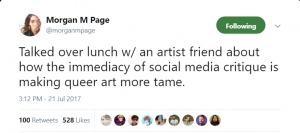I’ve been thinking about this for three months now, and when we had the conversation in class about Sorbello’s transphobia, thought of it again.

To spare you the entire tweet thread, queer historian Morgan Page argues that controversial, iconoclastic, and thought-provoking queer art is being pushed out of the contemporary art community due to artists harboring a fear of their being labeled as “problematic,” and rejected on political grounds. She chalks this up to social media’s “immediacy” and accessibility; on the internet, everyone and anyone can be a critic, and those critiques—which are often framed around a moral viewpoint—can be shared with ease. However, on sites like Twitter and Tumblr, there’s a tendency for critiques to become mobs. As Page recalls, there’s always been provocative art. However, she also says:
…in the 80s what was someone going to do? Write a nasty letter to the editor? Now they can send hundreds of messages directly, dox you.
This creates the danger of art becoming stagnant, as artists focus their efforts only on work that’s considered socially acceptable, in fear of that mobbing.
Certainly, at times, heavy backlash is appropriate—as Page notes, when we dismiss social media criticism, we also “run the risk of dismissing legitimate critique, particularly of racism” (which is particularly pervasive in white gay communities). (Or of transphobia, as demonstrated here on campus.) But it can also pose a threat to beginning or otherwise vulnerable artists, as critics, convinced they have the moral high ground, take it upon themselves to diminish and belittle an artist’s lived experiences.
Take Glip, a comic artist better known by the name “Glitched Puppet,” who produces the comic “Floraverse.” Earlier this year, a large group of ex-readers grouped up to accuse Glip and their partner of a number of “problematic” things, one of which was asexual erasure in Floraverse. According to these critics, Glip had claimed a character, Beleth, was asexual, then shown her having sex as a way to invalidate asexuality and cater to a homophobic audience.
Glip’s response was to remind their critics of a simple fact: Glip themself is asexual. And showing Beleth having sex was a way for them to convey their own experiences with sex as an asexual person in their art. In response to these critics, however, Glip made the decision to stop calling Beleth ace—Glip would rather stop telling their story than deal with what they call “gatekeepers.”
Elsewhere in the art world, gay artist David Wynne has argued that many “younger people” involved in queer discourse take too narrow a moral view when discussing how LGBTQ+ people live today. In a short Twitter thread discussing the 50th anniversary of the legalization of homosexuality in Britain, Wynne notes that growing up as a gay man in England, queerness was considered “an unspeakable thing” in many areas. As such, he was forced to hide his sexuality, and adopt a heteronormative and at-times-homophobic view of the world, as a way of keeping himself safe—an act that, he claims, has received criticism from younger artists. In his thread, he lashes out, stating:
…when we tell our stories in fiction, they are messy, they are complicated, they do not conform to an idealised narrative. It’s become a thing now, where I see one of my peers tell their story, then get dogpiled by 22yr olds for furthering problematic narratives. Well, I’m sorry, but our lives have been fucking problematic.
On an unrelated but still-kinda-related note, we also have to think about what the proper reaction should be when we find content that is offensive… but is being produced by artists who belong to the group that should be offended (for lack of a better term).
Consider Larry David’s monologue on Saturday Night Live this past weekend, which came under heavy criticism for some of the jokes he made, which included pointing out that many of the Hollywood executives recently accused of sexual assault are Jewish, and an extended bit about romance in Nazi Germany:
I often wonder: if I grew up in Poland during the time that Hitler came to power, and got sent to a concentration camp, would I still be checking out the women in the camp? I think I would!
A number of critics decried David’s monologue as anti-semitic and offensive. Yet, as David points out himself in the monologue, he himself is Jewish, and has built a career off of making jokes about his heritage. Do critics have a right to criticize David for making such jokes on moral grounds?
This is a lot of words to say that as the world continues to evolve, we need to consider how our art and our critiques will evolve with it. Nuance is key.

